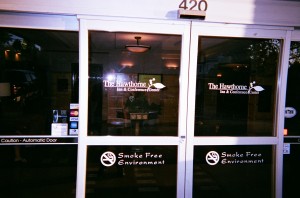 By Edward L. Sweda, Jr., Senior Attorney
By Edward L. Sweda, Jr., Senior Attorney
WINSTON-SALEM, N.C. — On Thursday, May 5, 2011, I made my way to this historic city via the Winston-Salem Express. Friday morning at 9:00 A.M. sharp was the scheduled start of the 2011 Annual Meeting of Shareholders of tobacco giant Reynolds American, Inc. (RAI).
Beautiful sunny skies greeted everyone in Winston-Salem on Friday morning. Having just walked into the lair, i.e. RAI’s corporate headquarters, I noticed an intriguing sign by the registration desk: “As a courtesy to non-smoking guests, the Annual Meeting will be a non-smoking event.” Not in any way a matter of health but, rather, a “courtesy.”
A Corporate Shift?
The 2011 Annual Shareholders Meeting of Reynolds American, Inc. (RAI) took place on a day when Daniel Delen, who took over as chief executive and president of the company in March, made what was billed as a major pronouncement. Noting the findings of a major study entitled “A State of Fear: Human Rights Abuses in North Carolina’s Tobacco Industry,” by Oxfam America and the Farm Labor Organizing Committee, AFL-CIO (FLOC) of the conditions under which tobacco farm workers in North Carolina do their work in the fields, Mr. Delen proposed that a multi-party council be formed to address these labor issues. Additionally, he publicly pledged to use an independent, third-party monitor to analyze the issue of the conditions under which these workers labor at U.S.-based farms that supply essential product to RAI.
A front-page article in the May 7, 2011 edition of the Winston-Salem Journal, entitled “Reynolds American Takes Step,” quoted Rev. Michael Crosby of the Interfaith Center for Corporate Responsibility: “I see a glimmer of hope on an issue we have been raising for a number of years. For your willingness to participate with stakeholders, I sprinkle holy water on you. Yet, because these discussions are going on at the highest levels with Altria and Philip Morris International, I would urge you to take the same level here.”
Mr. Delen’s promises, which will be put to the test in the upcoming weeks and months, stand in contrast to the public position of previous C.E.O. Susan Ivey, who insisted that RAI had no responsibility to take steps to improve working conditions of farm workers who labor under often unsafe working conditions on farms run by Reynolds’ suppliers.
Response to Litigation – More of the Same
However, on the litigation front, RAI management is as rigid as ever. During the question and answer session, to which RAI allotted all of 25 minutes – fully ten minutes more than at the 2010 Annual Shareholders Meeting – I addressed the major legal problems that R.J. Reynolds Tobacco Co. is facing in the Engle Progeny litigation in Florida. Shareholders are allowed up to two minutes to ask a question (a video board at the front of the meeting room featured a large numeric countdown from “2:00” once a shareholder began to speak); I mentioned that since February 2009, there have been 43 Engle Progeny trials that have reached a verdict and that 30 out of those 43 have been plaintiff verdicts. Just a week before the shareholders meeting, a jury in Jacksonville, where a disproportionately large number of the remaining 8,000 to 9,000 lawsuits yet to be tried are located, hit RAI with a $17 million punitive damages award. Furthermore, the company is appealing its multi-million dollar loss in the Martin case and must prevail in an uphill climb to convince the Florida Supreme Court to reverse its own 2006 landmark ruling in the Engle class-action case.
I concluded my remarks by asking whether the company, for the good of its shareholders, would move away from its current policy of refusing to settle these Engle Progeny cases.
Mark Holton, RAI’s Executive Vice President and General Counsel, responded by reiterating the company’s stated opposition to settling any of these cases and said that he was “confident that the Engle process violates due process” and that the company’s legal arguments are strong and would ultimately prevail. Though no follow-up questions are allowed, I commented that “the risk [for the company] is there.”
Shareholder Resolutions
Two important shareholder resolutions called on the company to address concerns regarding tobacco flavoring and to create human rights protocols for the company and its suppliers.
Flavorings
Noting that the U.S. Food and Drug Administration has found that the smoking of flavored cigarettes is more popular among youth than among adults, the proponents offered this resolution “that, because youth initiation of tobacco products is influenced by the flavoring, shareholders request that, within six months of Reynolds American Inc.’s annual meeting, the Board of Directors move to ensure that RAI stops the production of any of its tobacco products with such flavoring added, as well as their distribution and their marketing, unless and until it can be proven by independent and evidence-based research that such added flavors do not contribute to youth initiation of tobacco use.” Father Michael Crosby introduced the resolution while Anne Morrow Donley of Virginia seconded it (their remarks were limited to two minutes each).
RAI management, of course, opposed the resolution, falling back on the contention that the “flavorings utilized on our operating companies’ tobacco products are legally permitted.” The resolution was defeated with 3 million shares being voted “Yes” with 397 million “No.”
Human Rights
A major threat to the health of tobacco farm workers is Green Tobacco Sickness (GTS), which occurs when the skin absorbs nicotine after touching the tobacco plants. Another significant concern regarding Reynolds American, Inc. is that it receives leaf from Malawi, a country in which child labor in tobacco fields takes place.
This resolution stated that “shareholders request Reynolds American Tobacco Inc. Board of Directors to commit itself to create effective procedures to implement protocols ensuring basic worker rights consistent with internationally agreed-upon human rights conventions in the countries which supply its tobacco and to find ways to ensure, through truly independent monitoring, that its varied suppliers are enforcing these protocols as well as all other pertinent laws of the nations in which its suppliers operate.”
Father Crosby introduced the resolution while I seconded it. RAI’s opposition to this resolution attempted to pass off any responsibility on this issue onto the already overburdened regulatory apparatus of state and federal governments in the United States. Management also claimed that “RAI and its operating companies strive to comply with all laws and regulations.” In my allotted two minutes, I noted that, as an individual, I do not “strive to comply with laws, I comply with laws.” I noted that, while there would be serious consequences for me if I failed to comply with laws, there seem to be no consequences for RAI or its suppliers failing to comply with basic laws and regulations governing worker health and safety.
The resolution was defeated, having received 39 million shares voting “Yes”, with 361 million “No.”
Company Propaganda
Outside the auditorium where the meeting took place, RAI provided shareholders with copies of the company’s publications, one of which is a 33-page brochure entitled “Our Continuing Commitment,” the 2010 Corporate Social responsibility Report. On page 23 of the report, RAI informs its shareholders that “[d]uring the past four years, the American Snuff Co. Charitable Trust has contributed $40,000 to a campaign by Methodist Healthcare Foundation to build a 30-patient hospice residence for terminally ill people of all ages…” ,
Smoke-free facilities and public places
I was encouraged to see signs such as this one on the front door of the hotel in which I was staying in Winston-Salem.
As mentioned above, the shareholders meeting was entirely smoke-free.
To cap off my trip to North Carolina, on Friday night I attended a South Atlantic League baseball game between the Hickory Crawdads and the host Greensboro Grasshoppers. The game, won by Hickory 7-2, was played at NewBridge Bank Park, a smoke-free park.


